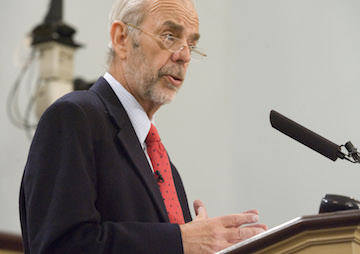A Pollster With Integrity: Remembering Andy Kohut
The founder of Pew Research Center and one of the nation's leading pollsters died Tuesday. He turned the phrase "Just the facts, ma'am" into a deeply humane commitment. In a time of passion, his passion was simply to get it right. Andrew Kohut in 2011. (Miller Center / CC BY-SA 2.0)
Andrew Kohut in 2011. (Miller Center / CC BY-SA 2.0)
On election night, 2004, George W. Bush seemed headed for re-election by a small but clear majority, and Andy Kohut was excited.
He and I were working that evening at NPR. Andy was then president of the Pew Research Center and his organization’s final poll had Bush winning by three points over John Kerry.
Watching Andy’s obvious pleasure, I said: “Andy, I didn’t know you were rooting for Bush.”
To which he replied: “I’m not rooting for Bush. I’m rooting for my number.”
And in the end, Bush defeated John Kerry in the popular vote by 2.4 percent. Andy’s number had done well. His numbers almost always did. Thanks to Andy, I could safely ignore the hype in 2012 among Mitt Romney’s supporters about “unskewed” polls predicting that President Obama was headed to defeat. The Pew final estimate showed Obama beating Romney by 3 points, with the trends suggesting the president’s lead might grow a bit. It was another Kohut number to believe in: Obama beat Romney by 3.9 points.
Like everyone who knew him, I am heartsick over Andy’s death on Tuesday at the age of 73 after a long fight with leukemia. The loss to our collective political knowledge is enormous, but he was also a rare Washington figure, “someone who didn’t differentiate based on title or position,” as a friend wrote in an email. He didn’t dismiss people. He wanted to hear them out.
This made him a better pollster. He was a small-d democrat deep in his bones. He admonished those who claimed that the opinions of the public are rooted in irrationality, illogic or a lack of information. No, Andy respected the people he polled and insisted there is a logic to how they arrive at their judgments. The pollster’s job is to work hard to figure out why people reach their conclusions.
He also didn’t like seeing people pigeon-holed into categories that didn’t really fit them. Thus he invented his political “typology” 28 years ago (updating it regularly) placing voters into eight to 12 affinity groups, often with cool names. My favorite of all his groups over the years: “the upbeats.” His approach allowed human beings to be as complicated as they actually are.
Andy’s reaction on that 2004 election night did not signal an indifference to what was good for our republic. He cared passionately about American politics and the country’s future. But he decided long ago that his contribution to the common good would be to produce absolutely unbiased and accurate information.
So, like all good social scientists, he was a political ascetic. He imposed a severe self-discipline on himself when it came to writing polling questions, picking samples, and choosing survey methods.
At a moment when so many seem to live by the principle “Here are the opinions on which I base my facts,” Andy wanted to provide facts about which others could form intelligent opinions.
His numbers were straight, his data were bulletproof, his questions were unbiased and clear. And to make sure the questions themselves weren’t creating opinions that people didn’t really hold, he’d sometimes ask several about the same issue, approaching it from different angles.
As Norman Ornstein of the American Enterprise Institute wrote in a lovely tribute on The Atlantic’s website, Andy’s uncompromising standards stood out at a moment when so many of the numbers floating around the political universe are less than reliable.
“Any fly-by-night hustler, or any ambitious consultant or institution,” Ornstein wrote, “can hang up a shingle that says ‘Acme Polling,’ release results, and have a good chance of having the results picked up by hungry news organizations that don’t care whether Acme Polling is any better than the Acme Company that outfitted Wile E. Coyote.” Well, not all news organizations, but it’s a well-taken point.
I worked with Andy for over 35 years, as a journalist and also, for a while, directly on surveys when I was part of what was then the Pew Forum on Religion and Public Life. Meetings with Andy about a poll were a joy. His democratic spirit applied to his pursuit of knowledge: Ideas — on what issues to explore, what questions to ask, how to ask them — were kicked around freely. Proposals and dissents were judged on their merits and argued with verve. Rank didn’t mean a thing.
Andy turned the phrase “Just the facts, ma’am” into a deeply humane commitment. In a time of passion, his passion was simply to get it right.
Your support matters…Independent journalism is under threat and overshadowed by heavily funded mainstream media.
You can help level the playing field. Become a member.
Your tax-deductible contribution keeps us digging beneath the headlines to give you thought-provoking, investigative reporting and analysis that unearths what's really happening- without compromise.
Give today to support our courageous, independent journalists.





You need to be a supporter to comment.
There are currently no responses to this article.
Be the first to respond.